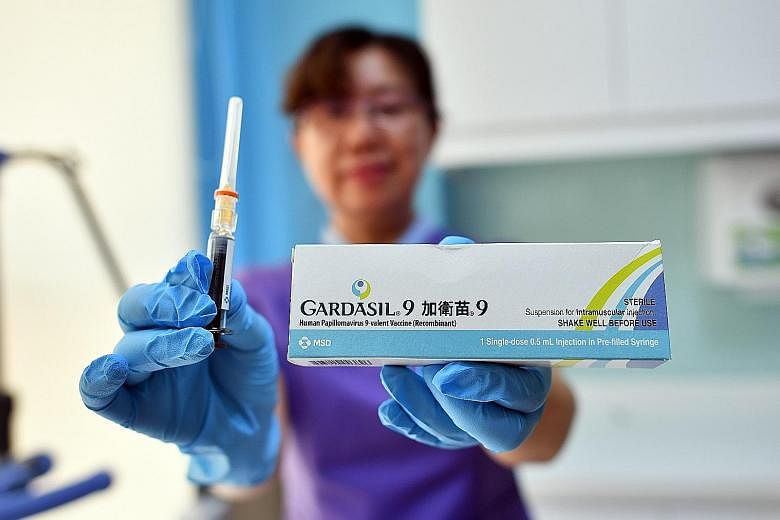HONG KONG • Medical tourism has been a great business for Ms Manna Wang, an insurance agent in Shenzhen who has been helping Chinese women travel to Hong Kong for a vaccine against the human papillomavirus, or HPV, which can cause cervical cancer.
Business has been so good, in fact, that the medicine is running is out.
In the two years since Merck & Co's Gardasil 9 became available in Hong Kong, about two million mainlanders have come for the shots, according to Xinhua news agency.
With the drugmaker unable to keep up, some clinics are turning away Chinese patients, and angry mainlanders have protested at Merck's local office.
The vaccine's cost has more than tripled to HK$8,000 (S$1,400) and complaints have flooded the city's consumer protection agency.
"The vaccine price is crazy," said Ms Wang, who last month stopped booking reservations for mainland women seeking the drug.
-
$1.4k
Current cost of the vaccine after its price more than trebled.
"It's a good vaccine, just not worth that price."
The supply crunch is just the latest example of how the sheer scale of Chinese demand has the power to disrupt life in Hong Kong. In 2013, a buying spree by mainlanders caused shortages of baby formula at city stores. The previous year, there were shortages of hospital beds because Chinese women were coming to the city to give birth.
"Hong Kong will always get hit by unexpected demand from Chinese consumers," said Bloomberg economist Fielding Chen in Hong Kong. "It's always difficult to forecast."
The events that led to Hong Kong's vaccine scramble began last summer when Merck was the victim of a cyber attack that disrupted production of Gardasil 9, which is the top-of-the-line HPV vaccine because it offers the broadest range of protection. Besides Hong Kong, clinics in New Zealand and Singapore have also reported shortages.
But the city's supply squeeze has been worsened by increased demand from China, where cervical cancer killed 30,000 women in 2015. The next year, mainland regulators began approving several older and less efficacious versions of the vaccine. The moves raised awareness about HPV and had the unintended effect of sending women in search of Gardasil 9, which was available in neighbouring Hong Kong.
Things came to a head in April, when a surge in requests for appointments forced the Family Planning Association of Hong Kong to announce it would stop giving the shots to non-local residents. And a confrontation on June 6 between about 10 mainlanders and staff at a Kowloon clinic turned violent, according to local media.
Gardasil 9 was approved by China's regulators in April and last month, a hospital in Hainan province's city of Boao became the vaccine's first mainland provider, charging 5,800 yuan (S$1,200) for the three shots. Gardasil 9 requires three injections over 12 months.
Eventually the availability of Gardasil 9 in the mainland should ease pressure on Hong Kong's clinics, but the city government is warning not to expect a quick return to normal.
Across the border in Shenzhen, Ms Wang is hopeful that the business will recover. "I've suggested my clients wait for a few months till the fervour fades."
BLOOMBERG

